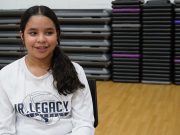Mihaela Plugarasu has been a professor of communication arts at Florida International University for four years. When the pandemic started, she, like many other instructors, had to move her classes online. While those meetings have often been constructive, they have taught her the importance of the classroom.
“When I go back to teaching full-time, face-to-face, if that ever happens, I think I will give people more time for human connection in my classes,” she says. “I think that it is the one thing that we all need to learn and grow as human beings, students and instructors.”
Since mid-March, institutions of higher learning across South Florida and the nation have been making the transition to remote learning. Teachers and students alike have become accustomed to the changes in unexpected ways. Having to completely change their thinking about education may lead to a new way of teaching — and for students, learning.
Gina Martinez is a University of Miami junior majoring in business and marketing. She found the transition to online learning to be necessary and difficult. Academically, I [am] not a fan of remote learning,” she said. “I found it challenging to pay attention in class because I would be in my room and sometimes on my bed, so it wasn’t the best learning environment.”
Mingli Yactayo, an FIU junior majoring in sociology, understands the need for remote learning, but it complicated her schedule in a way that will have future repercussions. “It was kind of difficult because I had to take a lab this fall and I couldn’t do it because of this situation,” she said. “I plan to take it, hopefully when the pandemic is over.”
When the pandemic began universities across the county hustled to start online learning. A few months later, they had time to think about what and how to organize schedules and classrooms.
“We didn’t know what the conditions would be like in September and frankly, we don’t know what the conditions will be like in November,” said Dr. Jeffrey Larson a professor and the director of distance learning at Barry University in Miami Shores. “But we did know that whatever model we chose had to have a strong presence online.”
Barry’s office of distance education came up with a plan to move face-to-face courses online to the Canvas Learning Management system. They hoped that would speed the transition.
Barry now offers its 7,000 students what it calls the flex learn model. “We are giving students the option of coming to campus for their classes, staying at home and taking them online, or doing a combination of both,” said Larson.
Online and hybrid courses are not new to universities and colleges around South Florida. But, few have much experience with the huge selection of what are called remote or synchronous remote courses they have had to offer during the pandemic.
Florida International University professor Karla Kennedy is director of online learning for the school of Communication, Architecture and the Arts. Moving forward, she says online and hybrid are changing the way people think about class schedules.
”We’re going to see more flexibility in the hybrid,” she said. “I think that it’s wonderful because we’re going to give students and instructors breathability and a lot more flexibility for meetings.”
It will also allow a wider array of classes, Kennedy added: “This opens up the door for a whole lot more education, collaboration, programs, cross-cultural and cross-reference. We are Florida International University, and I think that this will make us more internationally competitive and sound.”
Davalyn Suarez, a speech teacher at the University of Miami, has been able to adjust to the situation quickly, “Going into the semester I did not want to compromise how much students can learn from each other,” she said. “Because of the nature of the course I teach, my class is smaller and as a result, it is easier for us.”
While universities and colleges are already in the process of repopulating, instructors and students are having to consider whether or not they are comfortable with the transition back to campus after what they’ve experienced.
”I am personally okay with returning because I know that the university has put in a lot of safety protocols,” Suarez stated. “I think that they have been very supportive and transparent about their strategies.”
Dr. Rik Bair is the dean of continuing & international education at the University of Miami. His department oversees distance education. The way he sees it is that these circumstances have brought out a new way of learning.
“I think the real game is going to be in the certificate programs, the micro-learning courses, things like that,” he said. “That’s something that we can offer short-term online for adults that want to raise their level of knowledge, experience or their skill level.”

































